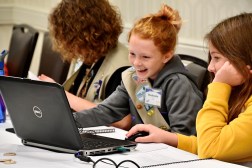Top U.S. cybersecurity official says solution to workforce shortage is in the classroom

Cybersecurity professionals could keep busy all 24 hours of the day just managing the growing volume of leaks, breaches and vulnerabilities, but according to the one of the government’s top cybersecurity officials, they have another critical job to do: getting kids excited about the field.
It’s an issue that is “near and dear to my heart,” Jeanette Manfra, the assistant secretary of Homeland Security for cybersecurity, said Tuesday in Washington, D.C., at the Security Through Innovation Summit.
“Everybody always says we have a tremendous challenge. I believe we have a tremendous opportunity” to encourage young people to consider a career in cybersecurity and fill a pipeline of the next generation of professionals, Manfra told a room full of cybersecurity experts working in government and industry.
Already there is a global shortage of professionals in the field — a problem that is getting increasingly worse — but the solution can be found in any given classroom today, she said. Millions of kids could be inspired to study and eventually pursue a career in cybersecurity, but for that to happen, they need to understand what makes it fulfilling and interesting, she said.
“Let’s make them excited about not just sitting and browsing online but actually securing that for the future,” Manfra said. “We need to be getting out there and explaining this is really exciting, talk to them about how we’re the ‘ninjas’ that are securing cyberspace. Make it cool. … Let them learn about what computers actually do and how networks actually work.”
Young people need to be exposed to the field’s leaders and decision-makers, Manfra said. “You can put out all the commercials and create curricula … but until kids see role models that have chosen that profession, they’re not as likely to do it.”
Efforts to recruit students into cybersecurity jobs are a win-win, Manfra said. Some of them will inevitably join the field, but even those who don’t will gain something valuable.
“Ideally, we get them excited and we actually get them into this discipline, [but] at a minimum, we will teach them how to all be a little bit more aware and a little bit more responsible as a digital citizen,” she said.
Stereotypes about working in cybersecurity and technology certainly don’t help with the workforce shortages (or gender disparity), but organizations like the Girl Scouts — which Manfra specifically named — are trying to change the messaging around cybersecurity so it’s more inclusive.




